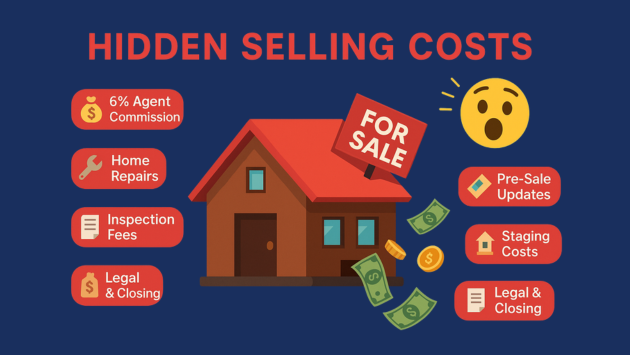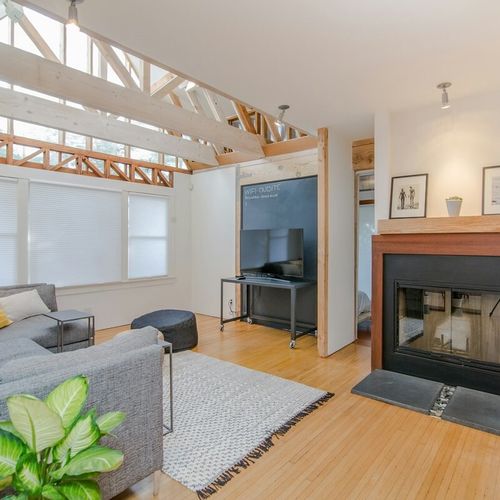Selling a home can feel like a major financial win—especially in a strong market. But what many homeowners overlook is that the sale process comes with its own set of costs. Some are expected, like agent commissions, but others can catch you off guard and quietly reduce your bottom line.
From prepping your home for listing to negotiating buyer requests and covering various closing fees, it’s easy to underestimate just how much you’ll spend before the check is in your hand. The truth is, selling a home isn’t free—even when the offer price is high.
Being aware of these hidden costs empowers you to budget accurately, set realistic expectations, and make decisions that protect your equity. Whether you’re preparing to sell soon or just planning ahead, here are 7 expenses that every seller should know about—and how to plan for them.
1. Pre-Listing Prep (Repairs, Cleaning & Staging)
Before you list your home, you’ll likely need to invest in making it market-ready. This can include deep cleaning, minor repairs (like patching holes, replacing light fixtures, or fixing leaky faucets), exterior landscaping, pressure washing, or even repainting walls in neutral colors. Some sellers also choose to professionally stage their homes—especially in competitive markets—to help buyers visualize the space. These upfront costs can range from a few hundred to several thousand dollars but are often essential for getting top dollar.

2. Realtor Commissions
Realtor commissions are typically the largest expense in a home sale. The standard rate is around 5–6% of the sale price, split between your agent and the buyer’s agent. While this can feel like a significant cost, experienced agents often help sellers net more overall through expert pricing, marketing, negotiation, and contract management. It’s important to understand what services you’re getting in return and view this as a professional fee for maximizing your outcome—not just a line item to minimize.

3. Seller Concessions or Repair Credits
Even after a great offer, many buyers will request concessions during inspections. These might include a reduction in price, a credit for repairs, or a request for you to cover part of their closing costs. While negotiable, these concessions often become necessary to keep the deal from falling apart—especially if the home inspection uncovers issues. If you haven't budgeted for this, it can come as an unpleasant surprise late in the process.

4. Moving Costs & Temporary Housing
The logistics of moving—especially when timing is tight—can be more costly than expected. Hiring professional movers, renting a truck, buying packing supplies, or storing furniture can all add up. And if your new home isn’t ready when your current one sells, you might need to arrange for temporary housing. That means paying rent, storage fees, or even staying in a hotel—all while juggling a major life transition.

5. Capital Gains Tax or Other Taxes
In most cases, homeowners are exempt from paying capital gains taxes if they’ve lived in the home for two out of the last five years. However, if you’ve made a large profit—especially on an investment property or second home—you may owe taxes on the gains. It’s a good idea to speak with a tax advisor before listing to avoid unexpected tax bills after the sale. Also, some states or municipalities impose transfer taxes or fees at closing.

6. Utilities, Insurance, & Carrying Costs Until Closing
Even after you accept an offer, the home remains your responsibility until the deal closes—which can take 30–60 days. That means keeping up with utility bills, home insurance, lawn care, and HOA dues. If the buyer’s financing is delayed or they back out, these costs can stretch longer than you planned. Sellers often forget to factor in these carrying costs when calculating their net proceeds.

7. Title, Escrow & Closing Fees
Sellers typically pay for a portion of closing costs depending on local customs and contract terms. Common expenses include title insurance, escrow or attorney fees, document recording fees, and home warranty plans (if offered to the buyer). While not massive on their own, these costs can add up to several thousand dollars and should be built into your financial plan from the beginning.

Final Thoughts
Selling a home is about more than getting a great offer—it’s about protecting your profit. Understanding the full scope of costs involved helps you avoid surprises, negotiate more effectively, and walk away with confidence (and cash in hand). If you’re thinking about selling and want a clear picture of what to expect, reach out today for a personalized pre-sale strategy session.
Sources:
179 Ways Agents Who Are REALTORS® Are Worth Every Penny of Their Compensation
NAR Settlement FAQ (Compensation & MLS Updates)
Topic no. 701, Sale of your home
Publication 523 Selling Your Home



